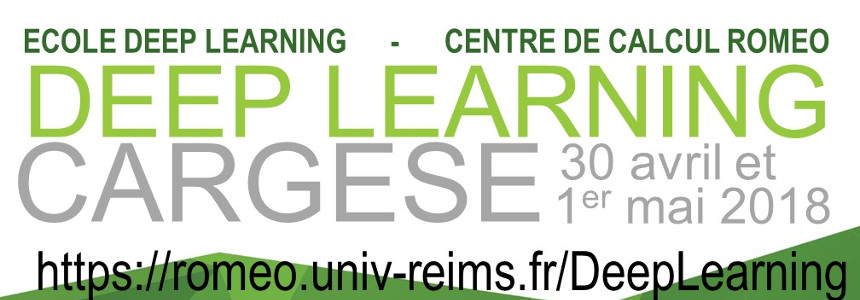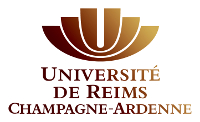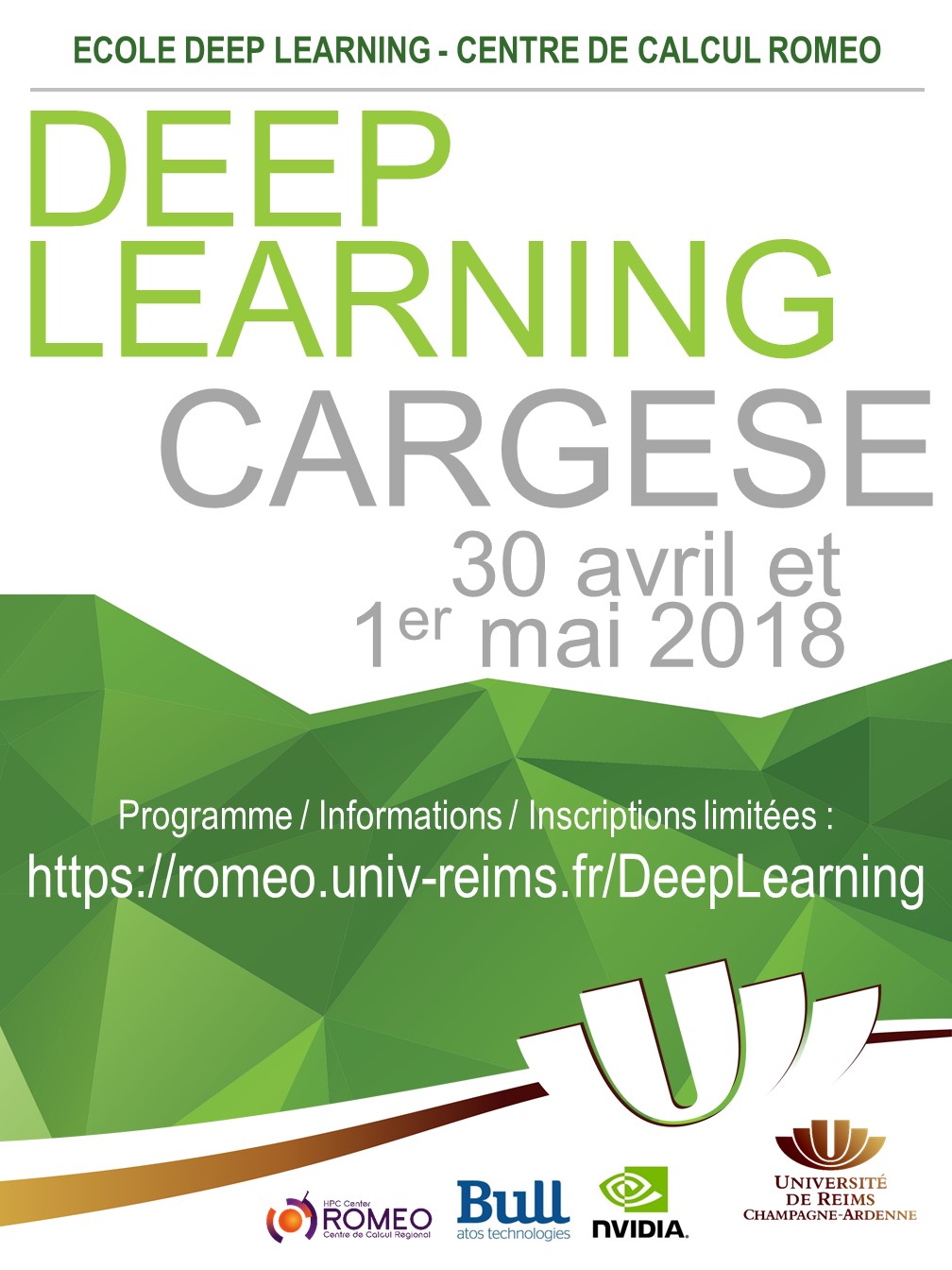Le Centre de Calcul ROMEO organise son école annuelle DeepLearning dans le cadre d'une session spéciale des journées DEVS francophones.
Fundamentals of Deep Learning
for Computer Vision
Dates des journée DEVS : du 29 avril au 5 mai 2018
Dates de l'école Deep Learning : lundi 30 avril et mardi 1er mai 2018
Formation : Deep Learning
Lieu : Institut d'Etudes Scientifiques de Cargèse - CNRS - Corse (Ajaccio)
Lien pratique et inscription : http://devs-network.org/jdf-2018
Lien pratique et inscription : Inscription
Information pratiques : les frais d'inscription incluent l'hébergement et les frais de restauration

Le Centre de Calcul Régional ROMEO et NVIDIA proposent une formation dédiée au Deep Learning, les lundi 30 avril et mardi 1er mai 2018 à Institut d'Etudes Scientifiques de Cargèse. Cette formation formation fait suite aux deux premières formations d'initiations et est destinée à la fois aux universitaires et entreprises qui souhaitent découvrir le Deep Learning et en expérimenter les capacités dans un environnement NVIDIA / GDX-1.
L'ensemble aura lieu en Français, mais les contenus sont majoritairement disponibles en langue anglaise.
Intervenants :
Intervenants certifiés* DLI Instructor Certified

Université de Reims
Champagne-Ardenne
Instructeur DeepLearning

ROMEO HPC Center
URCA - Instructeur Certifié DLI Deep Learning Institute
Sponsors :

Planning :
Jour 1, lundi 30 avril :
8h30 : Accueil / Café
9h00 : KEYNOTE commune (DL / ABM / JDF) : The Discipline of Modeling and Simulation by Saikou Diallo
10h00 : Pause Café
10h15 : Conférence plénière commune (DL / ABM / JDF) : Spatial statistics for monitoring land use changes: towards optimal use of big data by Alfred Stein • Deep Learning by Michaël Krajecki, François Alin
12h00 : Déjeuner
13h30 : Ecole DeepLearning, session 1
16h00 : Pause Café
16h30 : Ecole DeepLearning, session 2
19h00 : fin de la session 2
20h30 : Repas "Social Event" à l'IES
Jour 2, mardi 1 mai :
8h30 : Accueil / Café
9h00 : KEYNOTE commune (DL / ABM / JDF) : Agent Based Model by Dawn Parker
10h00 : Pause Café
10h15 : Ecole DeepLearning, session 3
12:00 : Déjeuner
13h30 : Conférence plénière commune (DL / ABM / JDF) : Enjeux de la reproductibilité des expériences numériques de simulation par David Hill
14h30 : Ecole DeepLearning, session 4
16:00 : Pause Café
16h30 : Ecole DeepLearning, session 5
19h: Atelier RED - Challenge de reproductibilité
20h: Repas en ville
L'événement sur prolonge jusqu'au vendredi 4 mai avec retour en navette à Ajaccio le samedi 5 au matin : retrouvez le planning complet sur le site de l'événement http://devs-network.org/jdf-2018
Programme :
Présentation du Centre de Calcul ROMEO
Introduction to NVIDIA software et hardware for Deep Learning
Introduction to Deep Learning : du Neurone au Réseau de Neurone
Le contenu des labs est en langue anglaise, mais l'échange avec les intervenants aura lieu en Français.
In this hands-on course, you will learn the basics of deep learning by training and deploying neural networks.
Explore the fundamentals of deep learning by training neural networks and using results to improve performance and capabilities. In this hands-on course, you will learn the basics of deep learning by training and deploying neural networks. On completion, you will be able to solve your own problems with deep learning.
You will learn how to:
- Implement common deep learning workflows, such as image classification and object detection.
- Experiment with data, training parameters, network structure and other strategies to increase performance and capability.
- Deploy your neural networks to start solving real-world problems.
After completing the course, you will receive a certificate.
Image Classification with DIGITS
Deep learning enables entirely new solutions by replacing hand-coded instructions with models learned from examples. Train a deep neural network to recognize handwritten digits by:
- Loading image data to a training environment
- Choosing and training a network
- Testing with new data and iterating to improve performance
On completion of this Lab, you will be able to assess what data you should be training from.
Object Detection with DIGITS
Many problems have established deep learning solutions, but sometimes the problem that you want to solve does not. Learn to create custom solutions through the challenge of detecting whale faces from aerial images by: - Combining traditional computer vision with deep learning - Performing minor “brain surgery” on an existing neural network using the deep learning framework Caffe - Harnessing the knowledge of the deep learning community by identifying and using a purpose-built network and end-to-end labeled data. Upon completion of this lab, you will be able to solve unique problems with deep learning.
Neural Network Deployment with DIGITS and TensorRT
Deep learning allows us to map inputs to outputs that are extremely computationally intense. Learn to deploy deep learning to applications that recognize images and detect pedestrians in real time by:
- Accessing and understanding the files that make up a trained model
- Building from each function’s unique input and output
- Optimizing the most computationally intense parts of your application for different performance metrics like throughput and latency
Upon completion of this Lab, you will be able to implement deep learning to solve problems in the real world.
Le planning, le programme et la liste des intervenants sont en cours de construction et non définitifs.
Environnement
Chaque participant apportera son PC portable pour suivre les formations. Pensez à configurer EDUROAM depuis votre établissement.

* Procédure en cours





